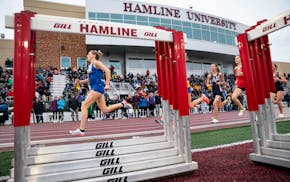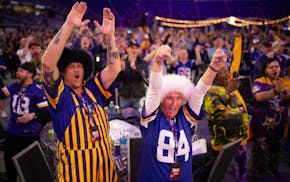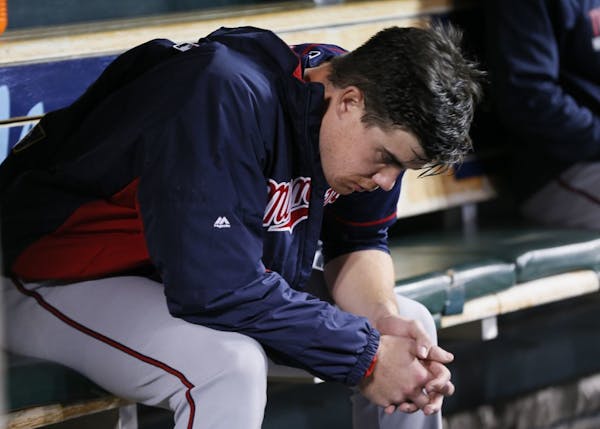DETROIT – Phil Hughes was shocked by the support he received from fans who demanded he receive a $500,000 bonus from the Twins despite finishing one out short of the required 210 innings.
"That was very kind of them to appreciate what I've done this year," he said. "You don't really expect people to want professional athletes to get paid more money."
And you really don't expect the people paying that money to be so eager to write the check. But the Twins surprised their ace Thursday by offering him a chance to pitch out of the bullpen this weekend, retire one Tigers batter, and trigger that half-million dollars. His answer might have been the biggest shocker of all:
No.
"I just didn't feel it was right," said Hughes, who had never pitched more than 191 innings before this season, his first under a three-year, $24 million contract. "[It] was very generous. It says a lot about this organization. But I owe my 100 percent health to this organization over the next two years, and I'm not going to do anything to risk that. ... For whatever reason, it's just not meant to be."
Apparently not. Hughes, who earned $8 million this year plus a pair of $250,000 bonuses for reaching 180 and 195 innings, would have had one more start ahead, in Sunday's season finale, but a rainout Sept. 12 in Cleveland pushed his starts back by a day. That made Wednesday's home finale against Arizona his final game of 2014, and he began it with 201⅔ innings, meaning he would have to pitch at least 8⅓ innings for his final bonus to kick in.
He mowed down the Diamondbacks through eight innings, but a sudden eighth-inning rain cell caused a 66-minute delay that cost Hughes a chance to pitch the ninth.
"That rain was situated right around downtown Minneapolis," General Manager Terry Ryan said. "It wasn't hardly raining anywhere else."
Manager Ron Gardenhire pronounced Hughes' season finished after the game, setting off some indignant reaction on social media. While the debate raged and Hughes' situation got national attention — CNN, ESPN and several other national outlets contacted the Twins for interviews — Gardenhire, Ryan and pitching coach Rick Anderson discussed the matter on the team flight. Ryan then consulted with Twins owner Jim Pohlad and President Dave St. Peter, and with their go-ahead, he decided to leave it up to Hughes.
"We called him in today — this organization feels we should do that, that he's earned every bit of it," Gardenhire said. "He thought about it and said, 'I just don't feel it.' He said, 'I feel like my arm's had enough, I don't want to risk an injury.' "
The prospect of pitching without his normal rest and out of his normal routine, with an arm tired from a long season, just to get one out was too much risk, Hughes decided.
"I feel good," he said, "and that's part of the reason I don't want to push the envelope as well."
He also could have jeopardized the major league record he set this season: his 11.625 strikeout-to-walk ratio, best in history. One walk, without a strikeout, would have cost him that record.
The Twins are not allowed, under terms of baseball's collective bargaining agreement, to pay the money for getting "close enough." They could restructure his contract, but "it's more complicated than meets the eye," Ryan said.
Hughes said he understands and supports the rationale behind those rules. "Absolutely, there's precedent involved — where you draw the line, things like that," he said. "They're not in the business of giving money away, and so obviously they have that to abide by, and I understand that 100 percent."
Ryan said he was impressed by the decision, adding: "He decided after a little thought, he just wasn't going to do it. So I respect that. It is a decision that would be difficult to make if you're a player."
Hughes, who went 16-10 with a 3.62 ERA, said it was actually pretty easy. The decision was his alone, "and it wasn't a tough call," he said. His agent, Nez Balelo — who would have collected a 4 percent commission, or $20,000 — agreed with his choice, and Hughes said he doesn't believe the MLB Players Association will mind him passing up the cash, either.
"It's my call, my career and my health," he said. "And it's not worth it to me."

Hamline Elite Meet, already in rare air, presents co-ed look for track
Bevy of defensive playmakers are available in Round 2 of the NFL draft after historic offensive run
Twins bring momentum on road despite Angels Stadium struggles

Neal: McCarthy mania sweeps through Vikings draft party

